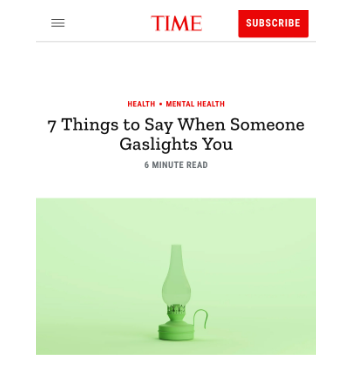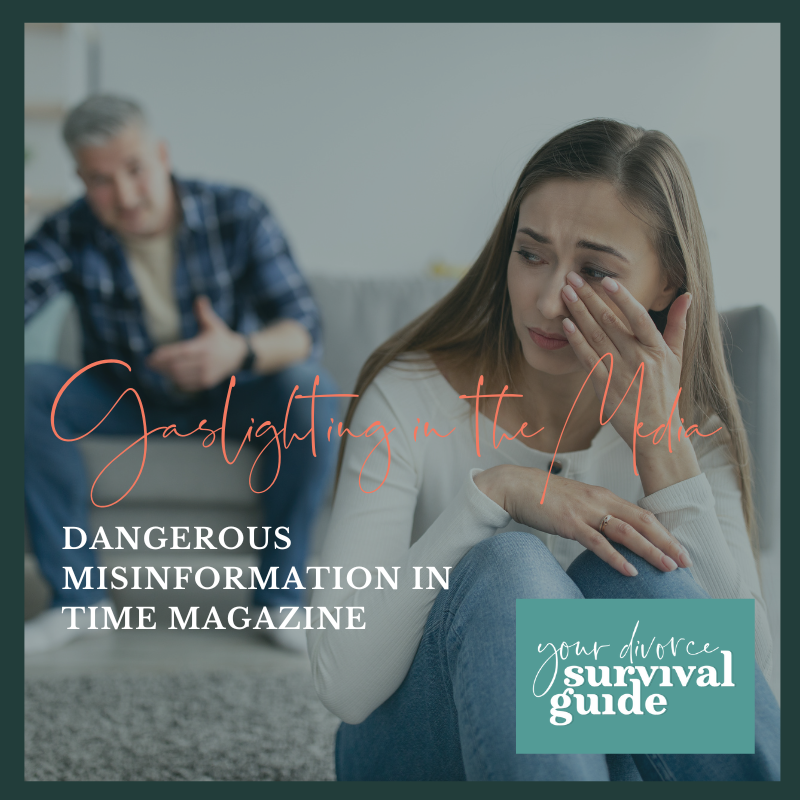Recently I was asked for a quote by Time Magazine for an article about gaslighting.
Here’s what they asked for:
- What to say to the person
- Why it’s effective
- Any tips on delivery/do you leave right after/how do you follow-up/etc.
Here’s what I submitted:
“Because true gaslighting is deliberate, there’s usually nothing you can say to them to get them to stop. Gaslighting is a tactic abusers use to control the minds of their victims. Anything you say to them about their gaslighting will likely be met with more gaslighting.
At its most extreme, gaslighting can be very dangerous, as the goal is to make you doubt your own experience of reality. When this happens enough, over time you begin to lose your grip on reality. This can present a serious mental health crisis for the victim, especially when they believe the person who’s gaslighting loves them. The cognitive dissonance can be extremely destabilizing.
The most effective and important thing is for the victim to learn to recognize the signs of gaslighting, and begin the very difficult work of separating this behavior from what the abuser calls “love.” They should then work to remove themselves from the relationship with the help of a domestic violence victim’s advocate, or a mental health professional who is well-versed and trained in domestic violence.
Anything one says to someone who is deliberately gaslighting them further entrenches them in the relationship, which is the exact opposite of what is needed.”
They didn’t use my quote, but instead wrote an entire article on how to explain your humanity to someone who’s gaslighting you.

Let me be clear: gaslighting isn’t lying, nor is it having different memories of a conversation. Gaslighting isn’t arguing or fighting.
Since it was Merriam Webster’s Word of the Year for 2022, let’s use their definition: “to psychologically manipulate (a person) usually over an extended period of time so that the victim questions the validity of their own thoughts, perception of reality, or memories and experiences confusion, loss of confidence and self-esteem, and doubts concerning their own emotional or mental stability.”
One of the experts quoted in the article suggests telling your partner, “We may not agree, but my feelings are still valid.” She says that this works because, “Ideally, the other person will use it as an opportunity to look inward and reflect on the fact that their partner is feeling invalidated, which can temper the argument.” Again: this isn’t about an argument. This is an article that claims to be about gaslighting.
Gaslighting is a tool of abusers, none of whom are interested in looking inward or reflecting. Abusers are interested in one thing: power and control.
Let me tell you what I see in my clients who are being gaslit. I see women who are actually losing their grip on reality. I see women who are so confused, who are in a trauma response so often that the part of their brains responsible for executive function, rational thought, and working memory is completely offline. They begin to seem like the irrational ones, having large emotional responses to seemingly benign issues—indeed, a large part of gaslighting is when the abuser remains calm and in control in public (or via email or text) while pushing the victim’s buttons behind the scenes, and then standing back while the victim reacts wildly—and then calling them crazy. I see women who are in desperate need of removing themselves from a toxicity so great that it’s actually causing them severe mental instability, but who lack the executive function required to make the decisions needed to get out—which is exactly how abusers maintain power and control, and a large part of why victims don’t leave.
Another expert in the Time Magazine article suggests that each party write down their memories of what happened that “sparked the disagreement.” She says, “Spending time together reviewing what you each wrote can be eye-opening.”
When I was being gaslit by my ex, one of the most crazy-making aspects was that he clearly remembered everything that was said while I had almost no recollection of the dialogue. Why? Because I was in a trauma response and the very part of my brain responsible for working memory was literally shut down.
Again: gaslighting isn’t a “disagreement;” it’s psychological manipulation. Your abuser doesn’t care what you remember about the argument. They care about making you feel insane so they can control you.
Major publications like Time Magazine should be ashamed for prioritizing clickbait and trending SEO terms over accuracy. By spreading misinformation, they risk the lives and mental well-being of victims, all for the sake of boosting their online traffic.
Looking for support you can actually count on? Join us in Phoenix Rising: A Divorce Empowerment Collective.

